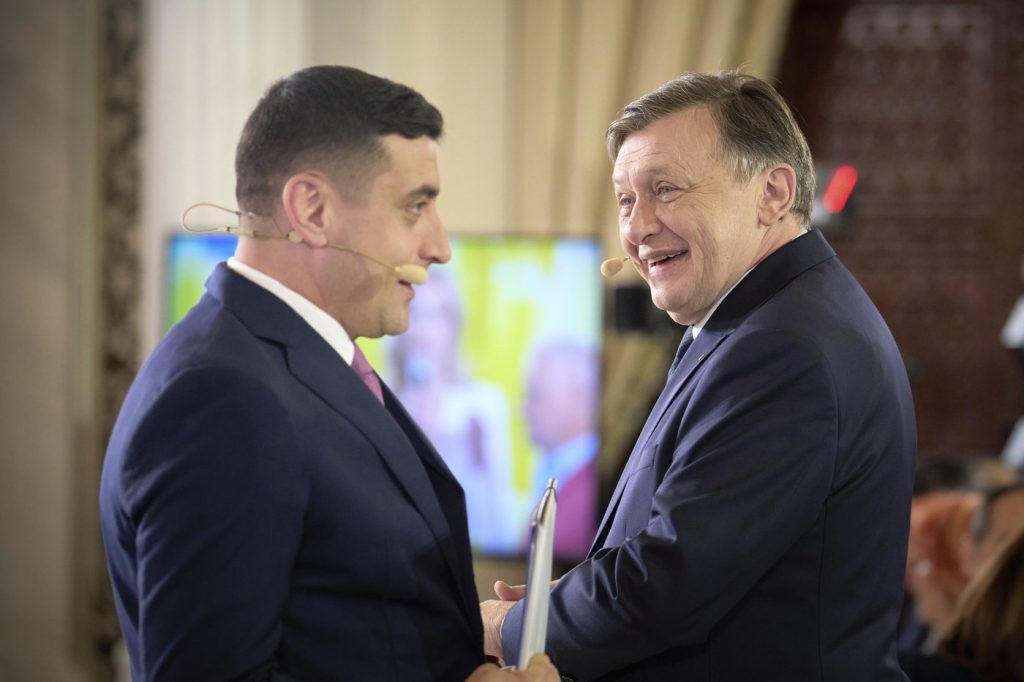As Romanians head to the polls on Sunday, an election of significant importance is underway, marking a decisive moment in the country's political landscape. George Simion, a hard-right nationalist leader aligned with MAGA-style rhetoric, has declared his mission to restore democracy and the people's will following the annulment of the previous election.
The political turmoil in Romania deepened last year when the Constitutional Court voided the prior election, which was marked by allegations of electoral violations and foreign interference, specifically from Russia, promoting outsider candidate Calin Georgescu. Georgescu's candidacy has been barred in the current elections, and he remains under investigation, while Moscow denies any meddling.
Simion, the 38-year-old leader of the Alliance for the Unity of Romanians (AUR), insisted that Romania never fully transitioned from communism to democracy in 1989. He claims that the Romanian populace has been living a "lie" regarding true democratic governance. With eleven candidates in the presidential race, a runoff is anticipated on May 18, as the presidential position wields substantial power over national security and foreign policy.
In last year’s election, Simion placed fourth but has now positioned himself as a champion of reform and constitutional order. Polls suggest he is likely to advance to the runoff, potentially facing off against Bucharest Mayor Nicusor Dan or the candidate from the ruling governing coalition, Crin Antonescu. Anti-establishment sentiment is driving an increase in support for nationalistic and far-right candidates across the EU, including Romania.
Simion's AUR party, which has doubled its support since the 2020 parliamentary elections, embraces values such as "family, nation, faith, and freedom." His campaign parallels the populist wave that swept through Europe, influenced by former U.S. President Donald Trump's political influence. Conversely, Nicusor Dan, a 55-year-old mathematician and former anti-corruption advocate, is campaigning on a pro-EU platform, advocating for systemic reforms in Romania's governance.
Crin Antonescu, a seasoned centrist politician, aims to maintain Romania's pro-Western affiliations. Meanwhile, Victor Ponta, a former prime minister, also echoes MAGA-style sentiments with his "Romania First" campaign, highlighting close ties to the Trump administration. Another contender, Elena Lasconi, who finished second in last year's first round, positions herself as an anti-establishment, pro-Western candidate, although her chances have been dimmed following her party's endorsement of Dan.
The ongoing election has garnered criticism from both the United States and Russia, influenced by the contentious annulment of the last election. U.S. Vice President JD Vance has publicly condemned the decision, asserting that respecting democracy requires valuing diverse opinions. The U.S. Embassy in Bucharest echoed these sentiments, reinforcing the need for citizen voices to be heard in governance.
Simion, who is banned from entering neighboring Moldova and Ukraine, faces scrutiny from critics accusing him of pro-Russian sentiments. Despite these accusations, he maintains that Russia represents a long-standing threat to Romania and advocates for NATO's strength alongside a more empowered EU consisting of its member states.
As Romania approaches this pivotal election, political consultant Cristian Andrei warns that a presidency under Simion could disrupt the political status quo and challenge Romania's relationships with the West. Supporters of Simion, such as energy sector worker Rares Ghiorghies, argue for the patriotic and conservative policies he promises, while opponents cite concerns over his potential to undermine democratic institutions and exacerbate prevailing socio-economic issues.
Ultimately, as the election unfolds, both candidates and their supporters will continue to navigate a complex landscape of political ambition, national identity, and a desire for reform in Romania's governance.











